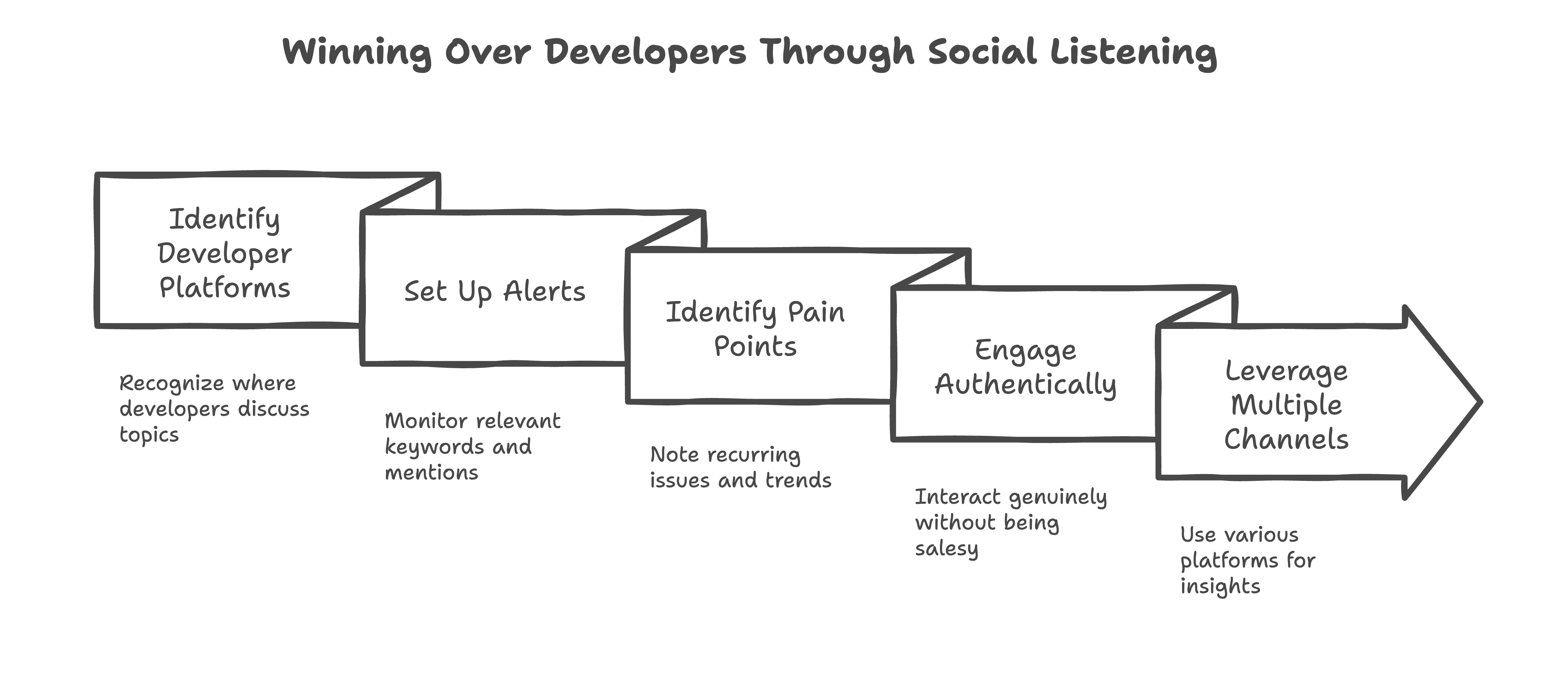The first step to winning over developers is listening to them. In 2025, developers have technical discussions in various places: X (Twitter), Reddit, Hacker News, Stack Overflow, Discord servers, Slack communities, GitHub issues, you name it. In previous roles, I made it a habit to “lurk” in these channels to absorb what devs were saying – not just about our tool, but about the general problems we aimed to solve. This kind of social listening helped me identify pain points and emerging needs straight from the source. Here’s how you can do it:

Track Relevant Keywords and Mentions: Set up alerts for your product name, competitor names, and problem keywords on platforms like X, Reddit, HN, Stack Overflow, etc. Remember, developers spend a ton of time online – if not on traditional social media, then on forums or Slack communities. There are social listening tools that monitor multiple channels for you. At the bottom, I listed my tool recommendations.
Join Developer Communities: Don’t just monitor from afar – become a community member. Join popular Discords or Slack workspaces for developers in your space (many open-source projects or tech stacks have these). Subscribe to subreddits (like r/devops, r/frontend, etc.) relevant to your domain. Follow the top hashtags on X (e.g. #JavaScript, #CloudComputing). The key is to listen before talking – understand the vibe, the pain points, the humor, the norms.
Identify Pain Points and Trends: Keep a notebook (or a doc) of recurring frustrations or feature requests you see. If every other week someone on Reddit asks “How do I manage X with no good tool for Y?”, that’s gold – an opportunity to position your devtool as a solution. This is how I noticed a lot of early chatter about consolidating community metrics across platforms, which validated the need for crowd.dev.
Engage Authentically: Once you’ve earned some credibility in a community (by listening and maybe chiming in on unrelated topics), start engaging around your domain. Answer questions helpfully – if someone’s struggling with a problem your tool solves, don’t swoop in with a sales pitch. Instead, offer genuine advice, perhaps mentioning your tool as an aside: “I had a similar issue, and ended up building a tool to automate that – feel free to check it out, but basically the solution is to do X, Y, Z.” By being genuinely helpful, you build goodwill. Developers appreciate when you’re solving their problem, not just pushing your product.
Leverage Multiple Channels: Different developer segments prefer different channels. Back at crowd.dev, we did a survey of 151 dev-focused companies and found, among many other insights, that X, LinkedIn, HackerNews and YouTube were the most popular platforms to publish content for developers. Personally, I got invaluable feedback from our own Discord community and also found leads by responding on Hacker News whenever “community metrics” were discussed. Each channel uncovered new insights.
Action plan
- Set up a social listening tool for at least 3 key platforms where your target devs hang out. See my tool recommendations below.
- Target your product name, competitor names, and problem keywords.
- Dedicate 30 minutes each day to scanning and replying to discussions.
- Gradually, start interacting – comment on a Reddit thread here, answer a Stack Overflow question there. Over time, you’ll become recognized as part of those communities, which makes it much easier to introduce your product naturally.
Social listening isn’t a one-time task but a continuous activity. If you stick to it it will pay out in the long-term and bring you not only new customers, but a much better understanding of what developers need.
Learn more about Social Listening
- Social Listening for Developer Tools: An In-Depth Guide - Octolens founder explains how to set up social listening for developer tools in an in-depth guide.
- From Audience to Action: The Developer Signal Hub – Explains how a developer marketing agency uses a “stack of social listening tools to track developer sentiment” across platforms like Reddit, Stack Overflow, and Twitter
- My favorite developer marketing channels – Developer marketing expert Jakub Czakon talks about his favorite marketing channels for developers, and mentions social listening as part of it..
- Developer Marketing Tool Report 2023 – Survey of 151 dev-focused companies about their marketing strategies (by crowd.dev).
- 5 Easy Ways to Recognize Developer Super Fans – Advises that by using a social listening platform, you can track who’s talking about your product on Stack Overflow or Reddit.
My tool recommendations
- Octolens: Most complete social listening tool for developer tools. Used by companies like Vercel, Metabase, or Medusa JS. (Disclaimer: The former Head of Ops of crowd.dev founded Octolens, and I’m an investor. But I genuinely believe they are building something special.)
- F5bot: Free tool. Good way to get started, but limited to Reddit, Hacker News, and Lobsters.
- Google Alerts: Free tool. Great to monitor news and blog posts. Misses most social conversations.